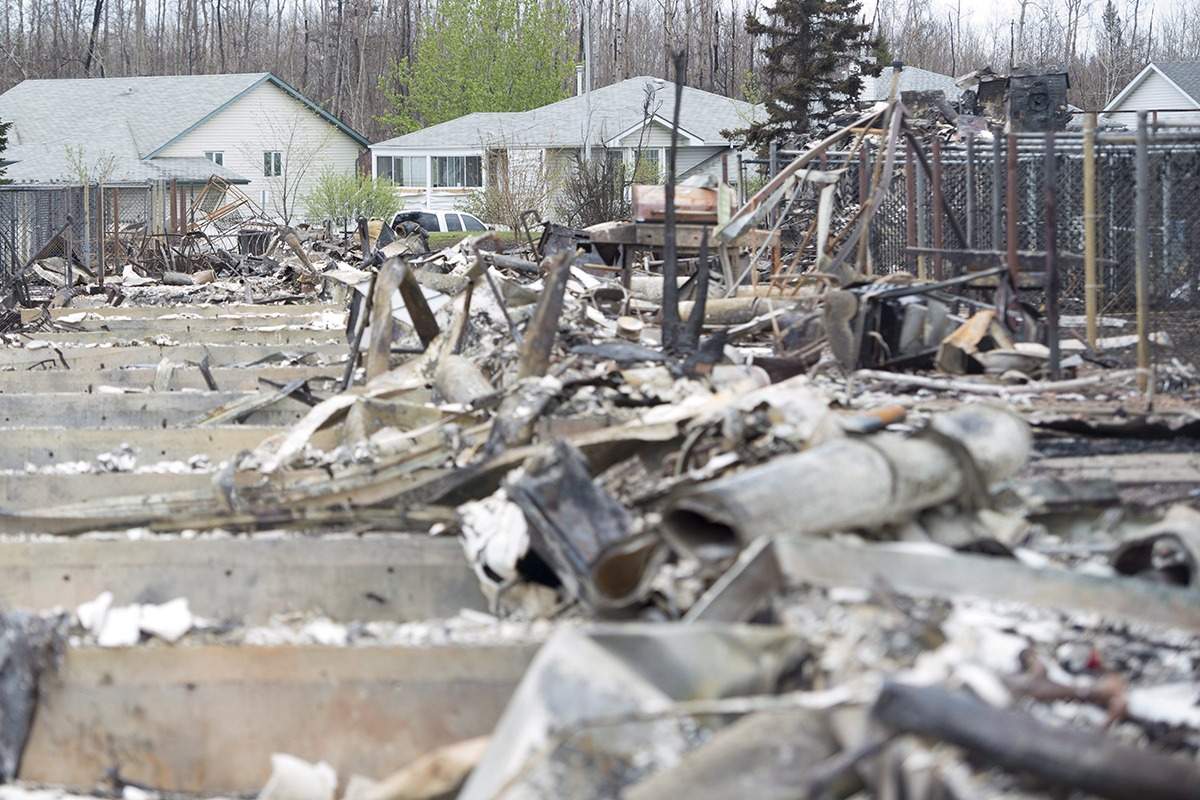Albertans and people living in wildfire-prone areas could see an increase in their insurance bills following the wildfire in Fort McMurray, according to one analyst.

“I think it’s safe to assume that the fire will become the largest insured loss in Canadian history,” said Jason Thistlethwaite, director of the Climate Change Adaptation Project at the University of Waterloo.
A 2011 fire in Slave Lake, Alberta, destroyed 374 properties and damaged another 32, according to the Insurance Bureau of Canada’s website. Insured damage from that fire amounted to more than $700 million.
In Fort McMurray, more than 2,400 structures were burned, according to the most recent damage assessment.
READ MORE: ‘Ocean of fire’ destroys 2,400 structures but 85% of Fort McMurray still stands
While it’s hard to estimate damages until insurers can survey the area, a BMO Capital Markets analysis last week estimated losses between $2.6 billion and $9 billion.
Almost all home insurance policies cover wildfire damage. So homeowners can expect to receive a cheque for the cost of rebuilding their home, as well as some coverage for things like living expenses while forced to flee their homes and food lost in a refrigerator or smoke damage to carpets. The size of the payout is calculated based on factors including the type of damage, value of goods in the house and the type of policy purchased.
READ MORE: Fort McMurray wildfire: Homeowners to face difficult choice of whether to rebuild
However, getting the money might take a while. People in Slave Lake had to wait anywhere from eight months to over two years for their homes to be rebuilt, said Bill Adams, vice-president for the western and pacific region for the Insurance Bureau of Canada.
- Calgary riders train for world BMX championships: ‘Pretty cool feeling’
- Here are Alberta’s most popular baby names of 2023
- Former Calgary mayor Naheed Nenshi expected to be focus of first Alberta NDP leadership debate
- Alberta to appeal judge’s ruling ordering release of documents on Rocky Mountain coal mining
Insurance companies could pass along payout costs to their other customers, said Thistlethwaite.
“Insurance is a business and when the industry suffers a significant loss, it tries to recoup those losses. The insurance industry recoups those losses by assessing for risk,” he said.
“Everyone in Canada contributes to property insurance, so we’re all contributing to offset some of the losses associated with the damage in Fort McMurray.”
Norma Nielson, a business professor at the University of Calgary, likens it to a pebble thrown into in a pond. “The way this works is the costs will spread out, literally around the world.
“A little like the ripple in a pond, you might see a bigger effect in Alberta, close to the pebble dropping, but the ripples may go further out.”
That means that most people will hardly notice a difference, she said.
Although Thistlethwaite believes there will be a noticeable increase in the cost of insurance, he isn’t picturing a massive hike. “There will be increases in the price of insurance, particularly in the province of Alberta, but I wouldn’t expect those increases to be so significant that you’re limiting the affordability of coverage.”
Smaller insurance companies may also decide to stop covering wildfire damage, or set a cap on the amount they will pay, he said.
Steve Kee, director for media and communications with the Insurance Bureau of Canada said he can’t speculate on insurance rates and it’s too early to tell what the fire’s effect will be.
“Insurers set their rates based on the projected costs. One isolated event won’t affect rates that much, if at all. Insurers look at trends over several years,” he said.
“Our members are all going to have different experiences and different exposure in these regions. It is too early to speculate on rates as we haven’t even got the numbers in on damages. Some consumers may alter coverage, raise deductibles, etc. to maintain consistency on premiums but really it is too early to tell.”
This is just how insurance works, said Nielson. “That’s the deal we make when we buy insurance: that if we’re lucky enough not to have our house burn, the money gets used to pay people who did.”
Loss prevention
Thistlethwaite hopes that following the fire in Fort McMurray, governments pay more attention to what can be done to prevent massive losses, rather than just relying on insurance to cover them.
It might be better to encourage people to build in less-risky areas, like further from the tree line, he said, or funding municipalities to put in safeguards.
“The more money that we put into reducing our vulnerability to extreme weather and natural disasters, the cheaper our insurance will be. It’s that simple.”
With files from the Canadian Press



Comments